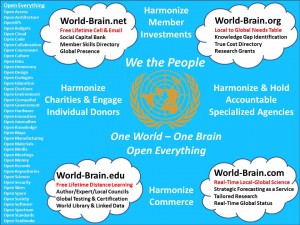
Slide: UN Cloud 3.1

Slide: UN Cloud 3.1

We are on the brink of a fundamental shift in society. As we journey towards the Networked Society we are unlocking the full potential of learning and education. Students and progressive teachers, empowered by technology, are turning established models on their heads while new skills and educational platforms are redefining our systems and institutions.
Contents:
1 A connected world 4
2 From evolution to revolution 5
3 Classroom disruption 6
Breaking down the walls 6
Knowledge everywhere 6
Lifelong learning 7
The empowered classroom 7
4 The science of change 8
5 Making the grade 10
Learning and Education in a Networked Society (PDF 12 Pages)
Phi Beta Iota: An Ericsson document. Most interesting point: mobile traffic expected to grow by fifteen times before 2017. Most absent word: “open.”
See Also:

Huang designs an open-source laptop
Shane McGlaun
TG Daily, December 18, 2012
Laptop powered by open operating system and designed around open hardware.
If you follow the technology world and the exploits of hardware hackers who like to mod devices such as Xbox 360 game consoles, you will unbdoubtedly recognize the name Bunnie Huang.
Huang is a notable hardware hacker who in 2010 leapt to the defense of one Matthew Crippen when he ran afoul of the federal government for running a business modding Xbox 360s in his garage.
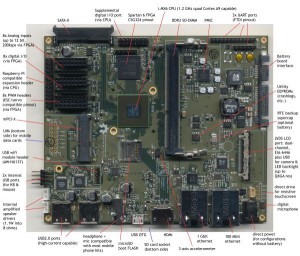
We haven't really discussed Huang 2010, but he is back along with some pals and a new design for an open laptop. Not only will this device run Linux, the laptop design will also be freely available for anyone to download, modify and use as they see fit.
The project – codenamed Novena – currently includes designs for a mainboard and battery board. Hardware includes a 1.2 GHz Freescale i.MX6 ARM Cortex-A9 quad-core processor paired with a Vivante GC2000 GPU (graphics). The above-mentioned processor isn't exactly a speed demon, but it is fast enough for the Linux operating system, especially Ubuntu.
The laptop design is said to be remarkably open – as the only proprietary drivers required are for Wi-Fi and graphics modules. The design is described as a DIY project for now. However, Huang says that if the project gathers enough interest he might eventually launch a campaign via Kickstarter to build notebooks for people who are interested.
Other key features of the open notebook design include a Raspberry Pi compatible expansion header, a single DDR3 SO-DIMM, an available interface for mobile data cards, USB Wi-Fi module header on the board, a direct drive for a resistive touchscreen and an integrated digital microphone.
See Also:
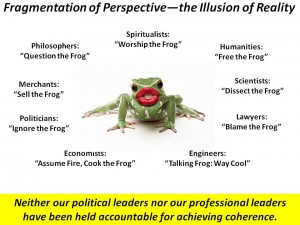
Tim Berners-Lee, director of the World Wide Web Consortium, coined the term in a design note discussing issues around the Semantic Web project
The goal of the W3C Semantic Web Education and Outreach group's Linking Open Data community project is to extend the Web with a data commons by publishing various open datasets as RDF on the Web and by setting RDF links between data items from different data sources. In October 2007, datasets consisted of over two billion RDF triples, which were interlinked by over two million RDF links.
Phi Beta Iota: Wikipedia has its limitations. This is not a very old idea as they suggest, but rather an extraordinary new idea, word-level linking. Doug Engelbart's Open Hyperdocument system (OHS) and Pierre Levy's Internet Economy Meta Language (IEML) are related ideas. What this huge new idea does is go beyond the “thing” to provide its attributes in Resource Description Framework (RDF). The attributes that are of interest from a public intelligence point of view are those of “true cost” — time, space, energy, water, child labor, tax avoidance, etcetera. Hence, each datum will be “context aware” and a specific item from a specific company will know where it is in time and space, its costs to date, and its projected costs into the future, all in relation to the specifics of its being.
DuckDuckGo / Linked Open Data (LOD)
Here is the updated image from Wikipedia of the linked datasets as of 2011:
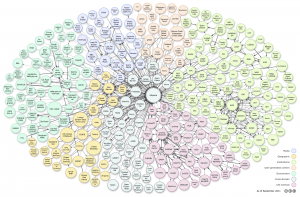

Always useful!
Important Cyberlaw & Info-Tech Policy Books (2012 Edition)
by Adam Thierer on December 17, 2012 · Add a Comment
The number of major cyberlaw and information tech policy books being published annually continues to grow at an astonishing pace, so much so that I have lost the ability to read and review all of them. In past years, I put together end-of-year lists of important info-tech policy books (here are the lists for 2008, 2009, 2010, and 2011) and I was fairly confident I had read just about everything of importance that was out there (at least that was available in the U.S.). But last year that became a real struggle for me and this year it became an impossibility. A decade ago, there was merely a trickle of Internet policy books coming out each year. Then the trickle turned into a steady stream. Now it has turned into a flood. Thus, I’ve had to become far more selective about what is on my reading list. (This is also because the volume of journal articles about info-tech policy matters has increased exponentially at the same time.)
So, here’s what I’m going to do. I’m going to discuss what I regard to be the five most important titles of 2012, briefly summarize a half dozen others that I’ve read, and then I’m just going to list the rest of the books out there. I’ve read most of them but I have placed an asterisk next to the ones I haven’t. Please let me know what titles I have missed so that I can add them to the list. (Incidentally, here’s my compendium of all the major tech policy books from the 2000s and here’s the running list of all my book reviews.)
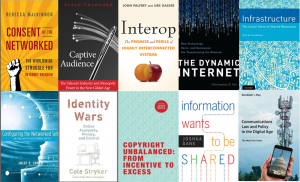
Phi Beta Iota: A total “WOW.”
Includes, in this order (click here to read reviews, below to reach Amazon page):
Rebecca MacKinnon – Consent of the Network: The Worldwide Struggle for Internet Freedom
Susan Crawford – Captive Audience: The Telecom Industry and Monopoly Power in the New Gilded Age
John Palfrey & Urs Gasser – Interop: The Promise and Perils of Highly Interconnected Systems
Christopher Yoo – The Dynamic Internet: How Technology, Users, and Businesses are Transforming the Network
Brett Frischmann –Infrastructure: The Social Value of Shared Resources
and others.

Deep Web Research and Discovery Resources 2013
By Marcus P. Zillman, Published on December 18, 2012
LLRX.com (Law and Technology Resources for Legal Professionals)
Bots, Blogs and News Aggregators (http://www.BotsBlogs.com/) is a keynote presentation that I have been delivering over the last several years, and much of my information comes from the extensive research that I have completed over the years into the “invisible” or what I like to call the “deep” web. The Deep Web covers somewhere in the vicinity of 1 trillion plus pages of information located through the world wide web in various files and formats that the current search engines on the Internet either cannot find or have difficulty accessing. The current search engines find hundreds of billions of pages at the present time of this writing. This report constantly updated at http://DeepWeb.us/ .
In the last several years, some of the more comprehensive search engines have written algorithms to search the deeper portions of the world wide web by attempting to find files such as .pdf, .doc, .xls, ppt, .ps. and others. These files are predominately used by businesses to communicate their information within their organization or to disseminate information to the external world from their organization. Searching for this information using deeper search techniques and the latest algorithms allows researchers to obtain a vast amount of corporate information that was previously unavailable or inaccessible. Research has also shown that even deeper information can be obtained from these files by searching and accessing the “properties” information on these files!
This report and guide is designed to give you the resources you need to better understand the history of the deep web research, as well as various classified resources that allow you to search through the currently available web to find those key sources of information nuggets only found by understanding how to search the “deep web”.
This Deep Web Research and Discovery Resources 2013 report and guide is divided into the following sections:
Continue reading “David Isenberg: Deep Web Research and Discovery Resources 2013”

Pirate Party Presses Charges Against Banks For WikiLeaks Blockade
Corruption: Today, the Swedish Pirate Party filed formal charges against Swedish banks for their discrimination against WikiLeaks, which has been systematically denied donations by payment providers since 2010.
Numerous payment service providers, including Visa, MasterCard, and PayPal, have blocked donations to WikiLeaks and other legal operations since 2010. Banks have been a part of the network of these service providers, which means that the banks actively participate in stopping donations without legitimate grounds. The Swedish Pirate Party says that this behavior is unacceptable and cause for grave concern, and has filed charges against the Swedish banks in question to try this behavior in court.
The charges were filed eariler today with the Swedish Finansinspektionen, the authority which oversees bank licenses and abuse of position. This follows an earlier initiative from the Pirate Party to regulate credit card companies on the European level in order to deny them the ability to determine who gets to trade and who doesn’t.